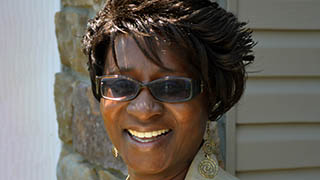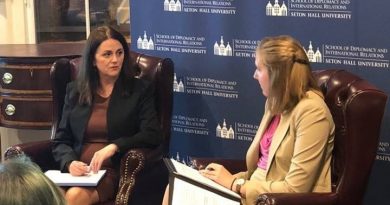Profile: Dr. Emelia Timpo, UN Expert and Sergio Vieria de Mello Visiting Chair
Shweta Parthasarathy
Digital Editor
Dr. Emelia Timpo, an expert in development with years of experience in the United Nations, joined Seton Hall University’s School of Diplomacy and International Relations as the Sergio Vieira de Mello Visiting Chair in the Practice of Post-conflict Diplomacy for the Fall 2021 semester. The de Mello Visiting Chair position was created in honor of Mr. Sergio Vieira de Mello, a Brazilian diplomat killed in the Canal Hotel bombing in Baghdad, Iraq in 2003.
Before joining the School of Diplomacy, Dr. Timpo had a long and successful career working with the UN and other international organizations. Dr. Timpo began her UN career in 1995 as a Partnership Officer with the Food and Agriculture Organization of the United Nations (FAO). She worked to improve connections between the FAO and international academic and research institutions by “pulling expertise globally” on issues such as food security, land resources, and poverty alleviation. Dr. Timpo also worked to provide countries in transition with connections to more developed countries to share experiences and strategies.
As the FAO’s representative to Namibia, Dr. Timpo worked to improve conditions in Namibia through the implementation of agricultural policies. In the late 1990s, Namibia was a newly independent country with a small population and limited technology, so it looked to the international community for guidance. The FAO’s goal, aligned with the interests of the Namibian government and citizenry, was to advise on poverty eradication. Dr. Timpo worked alongside various Namibian ministries on income generation, basic healthcare, establishing small farms, and implementing progressive agricultural policy.
Dr. Timpo then continued with her work on the HIV/AIDS epidemic with UNAIDS, the Joint United Nations Program on HIV and AIDS. In her capacity as Country Coordinator for Ethiopia, she oversaw the adoption of the African Union Declaration of Commitment on HIV/AIDS by the UN General Assembly.
“As the focal point for UNAIDS, I worked with other members of UNAIDS, other United Nations colleagues, and the country-level ambassadors based in Addis [Ababa]. Dr. Timpo explained. “My job was to justify and explain the numbers we used in the declaration, such as getting the commitment from every nation to use 15% of their national budget for healthcare.”
The goals of the Declaration, greatly incorporated into Dr. Timpo’s work with UNAIDS, were to mainstream HIV/AIDS prevention and treatment in the main national agendas of the countries involved and to ensure equality of access to treatment, care, and information. Understanding the inherent inequality within the epidemic, Dr. Timpo wanted to empower women to advocate for themselves, saying, “Our message was that if the men are not going to use condoms, they are not going to have sex with you.”
Dr. Timpo’s focus on the intersection of HIV/AIDS policy and inequality was a constant in her decade of work with UNAIDS. She described the disparity in access to prevention and treatment for AIDS between able-bodied people and people with disabilities. Treatment and information were inaccessible with the lack of wheelchairs and ramps with little available communication in Braille and sign language.
In terms of sexual orientation, while the stigma surrounding homosexuality naturally made it difficult for people to get treatment, some governments adopted a “don’t ask don’t tell” policy. According to Dr. Timpo, countries like Senegal and Iran provided their citizens with preventive care and treatment without inquiring about their sexual orientation. The policy temporarily set aside institutionalized homophobia for the good of the people.
Dr. Timpo, in every part of her career, has advocated for those who could not do so for themselves and represented the interests of several marginalized minority communities. Dr. Timpo explained that the most important thing to remember in careers where the work is on the behalf of others is to “look at everybody.” Everyone in the international community has different needs, and it is only through listening that one can ascertain what their true needs are rather than what outsiders deem as necessary.
In a male-dominated field like international development, Dr. Timpo explained that there will always be the expectations that women are “meek and lowly and get taken care of,” and that they should sit quietly and let the men lead. Especially, she explained, as a black woman from Africa, “it is assumed you come from nothing.” But, she says, “I don’t get paid to be a spectator,” explaining why she always chooses to stand up for herself.
As a woman, Dr. Timpo, like billions of other women, faced additional challenges because of her gender. But, also like billions of other women, she overcame these challenges to change the world. She emphasizes, “I am me. I am no better or worse than anybody else. I will be who I am, not what you think I should be.”


